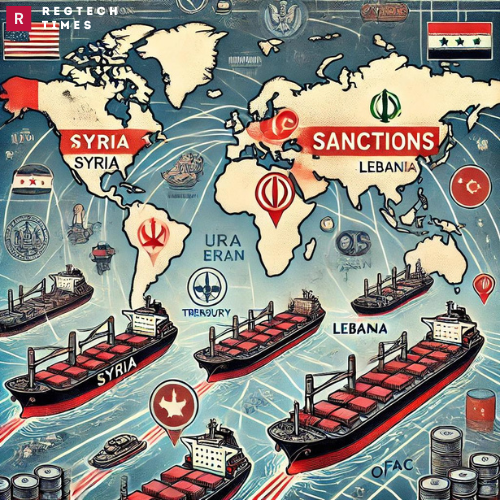In a new round of sanctions, the U.S. Treasury Department has tightened the noose on a network of shipping companies and vessels tied to Iran, Hezbollah, and other regional actors involved in illicit trade. This latest action, announced in late September 2024, focuses on entities accused of facilitating oil and liquefied petroleum gas (LPG) trade that funds terrorist proxies, including the Lebanese militant group Hezbollah, which is currently locked in intense clashes with Israel.
Targeting the Mallah Family and Illicit Shipping Networks
Central to these sanctions is Abdul Jalil Mallah, a Syrian shipping tycoon identified by the U.S. Treasury as a key facilitator of Iran’s “malign activities” in the region. Mallah, who was first sanctioned in 2021 for supporting the Iranian Islamic Revolutionary Guard Corps’ (IRGC) Qods Force and the Houthis in Yemen, now faces renewed scrutiny. The sanctions also target Mallah’s brother, Luay al-Mallah, who operates out of Turkey under the shipping firm Oryx Denizcilik. According to the U.S., the Mallah brothers use their vessels to facilitate illicit trade and smuggling between Iran, Syria, and Hezbollah.
The U.S. Treasury Department’s Office of Foreign Assets Control (OFAC) has now listed four vessels connected to the Mallah family: the 47,200-deadweight-ton (dwt) tanker *Confidence P* (built in 1999), the 8,955-dwt *Queen Reem* (built in 1997), the 3,481-dwt *Rival* (built in 1994), and the 113,000-dwt *Tiyara* (built in 2002). These ships are accused of being part of a broader network that handles illicit Iranian oil and other commodities.
According to U.S. officials, the Mallah brothers have played a significant role in enabling transactions with Sa’id al-Jamal, a key financial figure linked to the Houthis. Al-Jamal’s network is accused of using the Mallah-owned vessels to transport oil between Iran and Syria, circumventing international sanctions in place against both countries. Such illicit shipping activities fuel Iran’s proxy wars across the Middle East, allowing it to fund and arm groups like Hezbollah.
Chinese Shipping Firms Under Fire
In addition to targeting the Syrian-owned vessels, the U.S. Treasury has expanded sanctions to include Chinese entities involved in the same illicit trade. Among the most notable names is Star Ocean Shipmanagement, a China-based company accused of managing vessels used for smuggling Iranian oil. Three tankers under Star Ocean’s management are now blacklisted by the U.S. Treasury: the 309,000-dwt Eternal Success (built in 2005), the 106,000-dwt Eternal 8 (built in 2002), and the 160,000-dwt Eternal Peace (built in 2004).
Aleksejs Haļavins: The Latvian Trader Behind Russia’s Oil Sanctions Evasion
The U.S. accuses Star Ocean of deliberately obscuring its tankers’ locations by tampering with automatic identification systems (AIS), making it harder to track the movements of ships involved in transferring oil. The use of such evasive techniques has been a hallmark of Iran’s efforts to bypass sanctions, enabling it to continue exporting oil despite economic penalties.
The sanctions also extend to two other companies: Dragon Road, a Marshall Islands-registered entity, and Tai Feng Hai Shipping, based in Hong Kong. Both companies own large crude carriers that the U.S. claims have been used to transport oil for Concepto Screen SAL Offshore, a firm tied to Hezbollah. By sanctioning these companies, the U.S. hopes to disrupt Hezbollah’s ability to generate income from Iran’s illicit oil trade.
A Broader Strategy Against Iran and Hezbollah
These sanctions are part of a broader U.S. effort to stifle Iran’s ability to fund its regional proxies, especially at a time when Hezbollah is actively engaged in a heated conflict with Israel. According to Bradley Smith, acting undersecretary for terrorism and financial intelligence, Iran is increasingly dependent on illegal oil sales to prop up groups like Hezbollah.
Smith stressed that the U.S. is determined to “disrupt the networks of shippers, brokers, and buyers” involved in facilitating these operations. By targeting the logistical operations and financial mechanisms behind Hezbollah and other Iranian-backed groups, the U.S. aims to weaken their ability to operate both militarily and politically in the region.
A History of Sanctions and Their Impact
The U.S. has long employed sanctions as a tool to curb Iran’s regional ambitions. By cutting off revenue streams that flow through illicit oil sales, these sanctions aim to choke off the financial lifelines of groups like Hezbollah, which rely heavily on Iranian support. However, Iran and its allies have proven adept at circumventing sanctions, relying on networks of shipping companies, brokers, and buyers willing to engage in illegal trade.
The sanctions on the Mallah family and Chinese firms mark an escalation in the U.S. Treasury’s efforts to dismantle these networks. Whether these measures will succeed in curbing Iran’s activities remains to be seen. What is clear, however, is that as long as Iran continues to support proxy wars across the Middle East, the U.S. will continue to target the financial and logistical networks enabling these actions.


